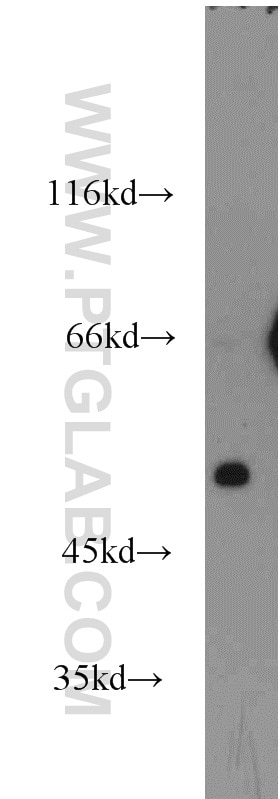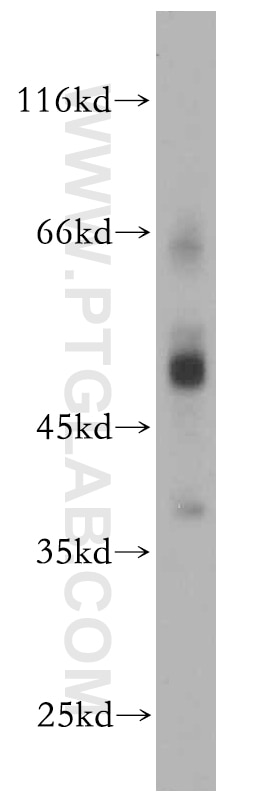Anticorps Polyclonal de lapin anti-SCTR
SCTR Polyclonal Antibody for WB, ELISA
Hôte / Isotype
Lapin / IgG
Réactivité testée
Humain, rat, souris
Applications
WB, ELISA
Conjugaison
Non conjugué
N° de cat : 14172-1-AP
Synonymes
Galerie de données de validation
Applications testées
| Résultats positifs en WB | tissu pancréatique de souris |
Dilution recommandée
| Application | Dilution |
|---|---|
| Western Blot (WB) | WB : 1:500-1:3000 |
| It is recommended that this reagent should be titrated in each testing system to obtain optimal results. | |
| Sample-dependent, check data in validation data gallery | |
Applications publiées
| WB | See 1 publications below |
Informations sur le produit
14172-1-AP cible SCTR dans les applications de WB, ELISA et montre une réactivité avec des échantillons Humain, rat, souris
| Réactivité | Humain, rat, souris |
| Réactivité citée | souris |
| Hôte / Isotype | Lapin / IgG |
| Clonalité | Polyclonal |
| Type | Anticorps |
| Immunogène | SCTR Protéine recombinante Ag5371 |
| Nom complet | SCTR |
| Masse moléculaire calculée | 440 aa, 50 kDa |
| Poids moléculaire observé | 50-55 kDa |
| Numéro d’acquisition GenBank | BC035757 |
| Symbole du gène | SCTR |
| Identification du gène (NCBI) | 6344 |
| Conjugaison | Non conjugué |
| Forme | Liquide |
| Méthode de purification | Purification par affinité contre l'antigène |
| Tampon de stockage | PBS with 0.02% sodium azide and 50% glycerol |
| Conditions de stockage | Stocker à -20°C. Stable pendant un an après l'expédition. L'aliquotage n'est pas nécessaire pour le stockage à -20oC Les 20ul contiennent 0,1% de BSA. |
Informations générales
SCTR is a member of the family B G protein-coupled receptors. SCTR is a receptor for SCT, a gastrointestinal peptide hormone secreted by the S cells of the duodenum. SCT regulates water homeostasis throughout the body, and influences the environment of the duodenum by regulating SCT in the stomach and pancreas. Studies suggest that SCT can act as a neuropeptide within the central nervous system (CNS), thus SCTR may regulate the function of the CNS.
Protocole
| Product Specific Protocols | |
|---|---|
| WB protocol for SCTR antibody 14172-1-AP | Download protocol |
| Standard Protocols | |
|---|---|
| Click here to view our Standard Protocols |



